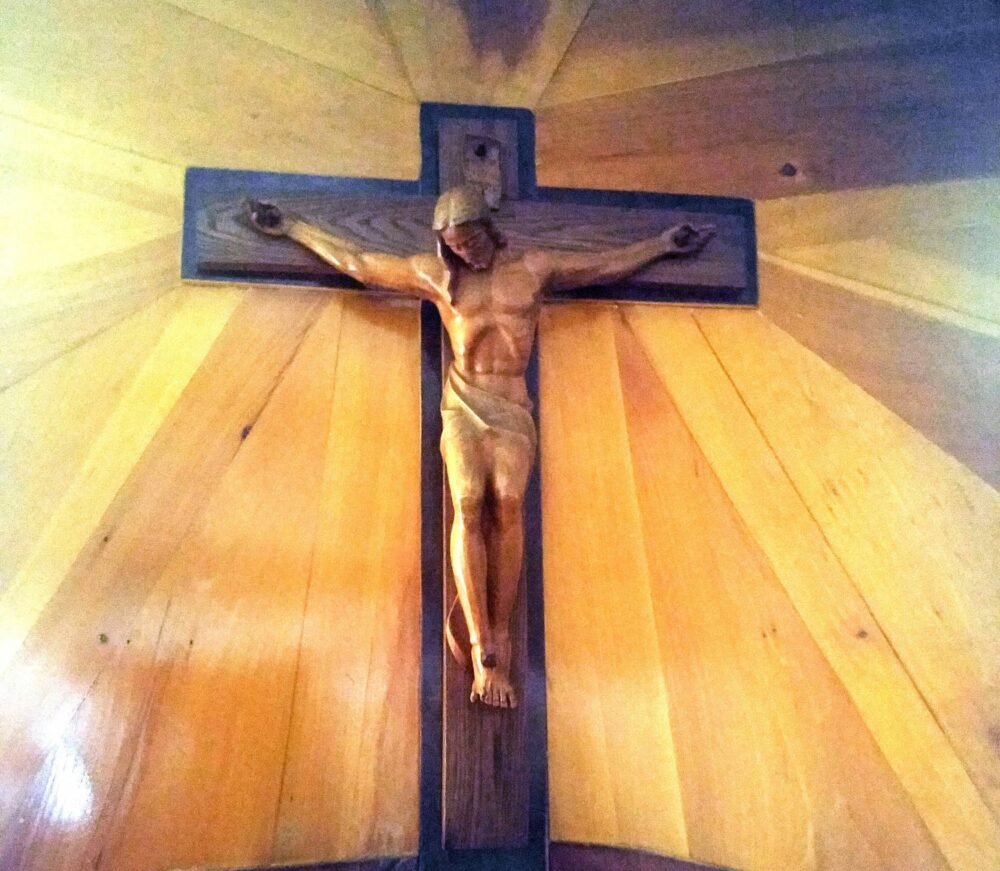
Beauty is hiding in secret places.
It has always seemed clear, and saints both far away and very close at hand have convinced me that it is so, that if we could let the Lord teach us to look at his cross with his own eyes, nothing any longer could resist the tide of transfiguration in us. We have learned, at least a little, to see the glory of the risen Lord in beauty, and that vision gives us joy. But perfect joy, complete transformation, lies in knowing that in Jesus, the Father has transfigured pain and death and sin itself.
There is a mystery here so simple that only the risen eyes of the Master can reveal its meaning. Pain begins in a refusal of love. Every pain suffered by every human began with someone’s refusal to love or to accept love.
The Father meant us to live in a world filled with his love, a world in which men and women would experience no pain, no sorrow, no loss, no death: none.
In a way we cannot grasp fully, our ancient parents said no to God’s love, and in saying no to the fullness of love, pain came. That is also how pain has entered into our own lives. Others have said no, refused to love us, and we have refused to love them, and we have received our inheritance of pain and death.
Yet it is as if the Lord Jesus says this about his cross: “I have touched your pain. I have entered every refusal of love, and each act of non-love I have embraced. I have pressed it into my body. I have become all pain. I have become all anguish. I have become all estrangement. I have become a curse. I have become ugliness. I have even become, in a way you will never understand, sin itself.
I have taken it into me — into my flesh, into my heart, into my spirit, and as I took it into me, I made it something new. I took it into me because I love you, because the Father loves me, because he loves you. And until the end of time my cross stands before you as the great sign of what I have done to pain. It stands before you as the sign of my love forever, so that when you make the sign of the cross over yourself, you are baptized in my love, you are plunged into my life, you are immersed with me in the Father.”
And he says this, too, it seems: “My cross is a sign of my Father’s love for you. You cannot hear the tears of God because they are too mysterious for the ears and the minds of human beings, but my passion is my Father’s passionate love for you. I am the infinite joy of my Father, but he was glad to see me die because he loves you so much, because your suffering is such an abomination to him that he could not bear you to endure it. In my heart he embraced all refusal to love, and filled it with my yes to him and to you, so that what was death has become life and what was nothing has become a work of love.”
Finally, it seems as if the Master says this with an infinitely deep voice: I want you to be the bearers of my resurrection in your own flesh. I want you to know the joy of God whose work is to make men and women live. I want you to know that the ugliness that has attached itself to you so closely that you cannot ever rid yourself of it is no longer what it seems to be. I have so embraced your refusal to love and so soaked you with light that you are becoming all light.
So, my brothers, my sisters, take up my cross, the cross of the poor, and let me make you one with me as you become one with them. I will make you one with my Father, and in my Spirit you will know and love us as we know and love you. And God’s joy will be your joy.
As the living knowledge of the Lord’s transfiguring cross cleanses my heart and gives me new eyes, I think of Agnes Sanford’s prayer: “Lord Jesus Christ, receive me into Thy own glorified being that I may abide with Thee.”
“Words,” she says, “are not great enough to describe that sense of walking about in a body of light that is not our own, but is his light.” Words are not great enough to proclaim the Good News that Jesus lives, that he lives in us so that even now we are transfigured children of God.
No words can encompass this mystery of joy, but once, over twenty-five years ago, my heart burst into song as I saw, a little, how the dark moment of Calvary had transformed the whole universe into Tabor:
Beauty is hiding in secret places
In earth-marred hands and fetid bins
In joy surprised in down-turned faces
In souls disclosed by griefs and sins.
Beauty is burning in sorrow’s coldness
Is blooming in soil of stony night.
Beauty is bursting from death and oldness
In flowers of splendor and light.
O earth reborn! O heart made new!
What midnights saw you rise?
O secret Tabor blossoming fast,
O morning white with dew!
Did you — Lazarus, brother, in dead man’s guise —
Dance at feel, beneath your feet, of grass?
Night is far advanced. The morning’s star shines like a great diamond at the throat of the dawn. The love of Christ has washed the whole world clean. Day is at hand.
Excerpted from Circling the Sun, by Fr. Robert Pelton, Washington D.C., Pastoral Press (1986), and Behold Your God, by Agnes Sanford, St. Paul, MN, Macalester Park Publishing Company (1958), p. 125.




